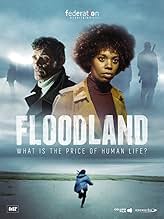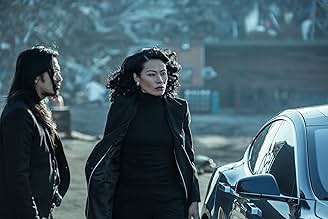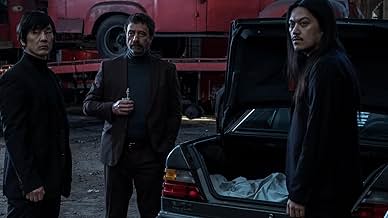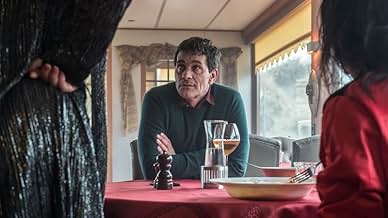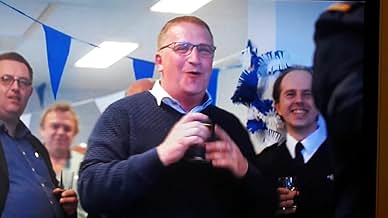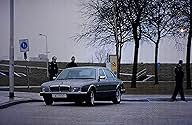En una remota zona fronteriza entre los Países Bajos y Bélgica, una niña nómada es econtrada. Su identidad es un gran misterio.En una remota zona fronteriza entre los Países Bajos y Bélgica, una niña nómada es econtrada. Su identidad es un gran misterio.En una remota zona fronteriza entre los Países Bajos y Bélgica, una niña nómada es econtrada. Su identidad es un gran misterio.
Explorar episodios
Opiniones destacadas
Don't even bother watching. You het stressed out by the bad story line and cliché's.
Script is really worthless - full of clichés and stupid useless scenes, most of the acting dreadful. The only thing that kept me watching is the scenery shots & Koen De Bouw.
Don't bother watching this. It's full of grotesk characters, which makes it almost unwatchable.
This series by Int title Floodland is an epic series. It deals - in an abstract way - with actual themes like migration, racism and xenophobia, guilt, revenge, criminal rituals, # Metoo and loneliness. The series is set up in a cinematic way, the landscapes are interestingly spooky and desolate. The cast is excellent, we liked Wim Willaert as Carlos Tierneteyn a lot. Also newcomers like Adana Unigwe ( only 16 years old), Robin Boissevain and Anne Laure Vandeputte are acting very well. The serie lifts off even more from episode 4. Has an interesting soundtrack also.
Summary
The series belongs to what already constitutes a subgenre, the police in the border area (such as The Bridge or Sorjonen), in this case the border area between Belgium and the Netherlands. Precisely, its locations in the marshes of the Scheldt estuary are one of its main protagonists, it adds an interesting twist to the issue of human trafficking, it shows off scenes of achieved squalor and violence, it combines the sinister with the grotesque well, but it lengthens unnecessarily the conflicts on the side of the "bad guys", spoiling a heterogeneity in them that was a success.
Review
In the wide estuary of the Scheldt, in the border area between Belgium and the Netherlands, a boat with numerous gunshot wounds and bloodstains and a young African woman (Afi, in charge of Adanna Unnigwe) appear, wandering around in a daze and dehydration. This will lead to a joint investigation by the Dutch and Belgian police and customs.
The theme of this series, raised almost from the beginning, is human smuggling and trafficking. The investigator of the case will be an Afro-descendant detective from Rotterdam, Tara Dessel (a charismatic Jasmine Sendar) to whom is added Bert, the designated therapist of the young African (Koen de Bouw), from Antwerp, who by the way assigns himself tasks that exceed psychological assistance, in one of the first failures of the script.
From then on, Tara (who, as befits a modern police officer, carries a traumatic episode that occurred in Rotterdam that affects her behavior), will have to face the misgivings of the locals, police corruption, a conspiratorial environment, mafias, dark family stories and two fearsome villains, one of them the kind of aristocrat Cornella Dingemanse (a tremendous Monic Hendrickx). The picture is complicated by the quarrels and rearrangements of the bad guys in the story, who are far from configuring a homogeneous block (a success that later turns against the development of the series).
By the way, the series belongs to what already constitutes a subgenre, the police in the border zone (such as The Bridge or Sorjonen). The original title, Grenslanders, means frontiers in Dutch. And it is another example of a very well presented story, with a development that is declining and a rebound towards the end.
Among the successes and strengths of this police series, we find in the first place the locations in the estuary of the Scheldt (a river that rises in France, crosses Belgium and empties into the Dutch coast), with its marshes over the North Sea and large movements of tides, desolate terrain from where, however, port facilities can be seen in the distance. This scenario is, without a doubt, a protagonist, because of its beauty and because it is essential for the development of the plot. Another success is that the crime of human trafficking is overlaid by history with a layer related to local traditions, which it is preferable not to reveal, giving rise to the presence of situations and characters that deliberately combine the sinister with the grotesque. Certain moments of the series reach an accomplished raw and soulless violence.
Perhaps the main drawback of the series is that once we meet the "culprits", the story is unnecessarily extended with the squabbles between them, looking stretched.
The series belongs to what already constitutes a subgenre, the police in the border area (such as The Bridge or Sorjonen), in this case the border area between Belgium and the Netherlands. Precisely, its locations in the marshes of the Scheldt estuary are one of its main protagonists, it adds an interesting twist to the issue of human trafficking, it shows off scenes of achieved squalor and violence, it combines the sinister with the grotesque well, but it lengthens unnecessarily the conflicts on the side of the "bad guys", spoiling a heterogeneity in them that was a success.
Review
In the wide estuary of the Scheldt, in the border area between Belgium and the Netherlands, a boat with numerous gunshot wounds and bloodstains and a young African woman (Afi, in charge of Adanna Unnigwe) appear, wandering around in a daze and dehydration. This will lead to a joint investigation by the Dutch and Belgian police and customs.
The theme of this series, raised almost from the beginning, is human smuggling and trafficking. The investigator of the case will be an Afro-descendant detective from Rotterdam, Tara Dessel (a charismatic Jasmine Sendar) to whom is added Bert, the designated therapist of the young African (Koen de Bouw), from Antwerp, who by the way assigns himself tasks that exceed psychological assistance, in one of the first failures of the script.
From then on, Tara (who, as befits a modern police officer, carries a traumatic episode that occurred in Rotterdam that affects her behavior), will have to face the misgivings of the locals, police corruption, a conspiratorial environment, mafias, dark family stories and two fearsome villains, one of them the kind of aristocrat Cornella Dingemanse (a tremendous Monic Hendrickx). The picture is complicated by the quarrels and rearrangements of the bad guys in the story, who are far from configuring a homogeneous block (a success that later turns against the development of the series).
By the way, the series belongs to what already constitutes a subgenre, the police in the border zone (such as The Bridge or Sorjonen). The original title, Grenslanders, means frontiers in Dutch. And it is another example of a very well presented story, with a development that is declining and a rebound towards the end.
Among the successes and strengths of this police series, we find in the first place the locations in the estuary of the Scheldt (a river that rises in France, crosses Belgium and empties into the Dutch coast), with its marshes over the North Sea and large movements of tides, desolate terrain from where, however, port facilities can be seen in the distance. This scenario is, without a doubt, a protagonist, because of its beauty and because it is essential for the development of the plot. Another success is that the crime of human trafficking is overlaid by history with a layer related to local traditions, which it is preferable not to reveal, giving rise to the presence of situations and characters that deliberately combine the sinister with the grotesque. Certain moments of the series reach an accomplished raw and soulless violence.
Perhaps the main drawback of the series is that once we meet the "culprits", the story is unnecessarily extended with the squabbles between them, looking stretched.
Selecciones populares
Inicia sesión para calificar y agrega a la lista de videos para obtener recomendaciones personalizadas
- How many seasons does Grenslanders have?Con tecnología de Alexa
Detalles
- Fecha de lanzamiento
- Países de origen
- Sitios oficiales
- Idiomas
- También se conoce como
- Floodland
- Locaciones de filmación
- Westende, Bélgica(Strandlaan 12)
- Productoras
- Ver más créditos de la compañía en IMDbPro
Contribuir a esta página
Sugiere una edición o agrega el contenido que falta

